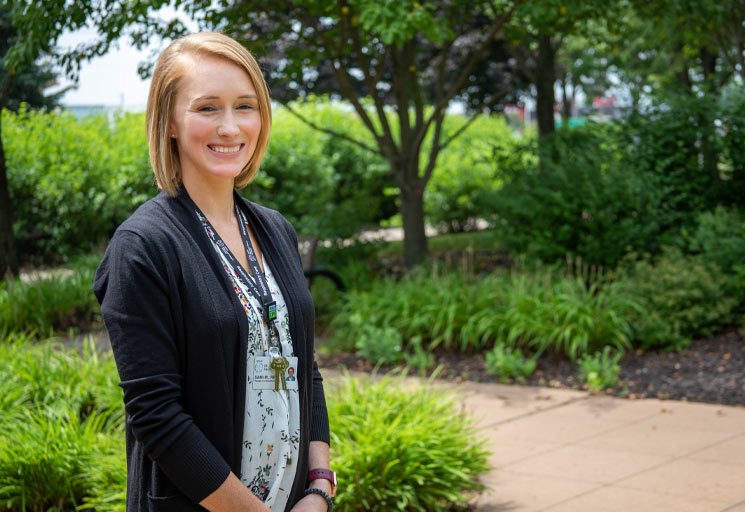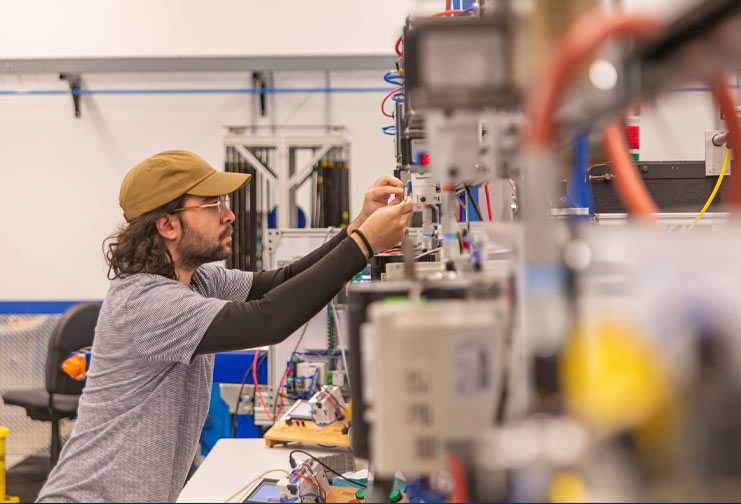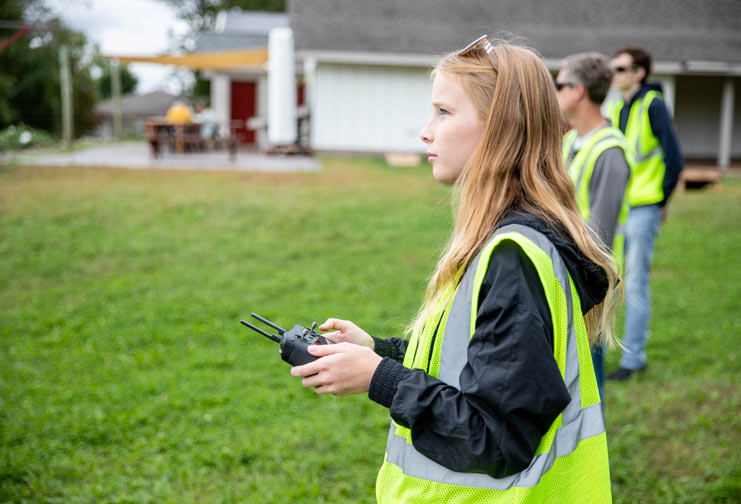Sunday, August 29, 2021
Respiratory Therapists talk about skills, safety and helping sick people

Sami Melssen, HSHS Sacred Heart and St. Joseph’s hospitals' manager of respiratory therapy, said her education at Chippewa Valley Technical College gave her the skills to continue through the COVID-19 pandemic.
For 15 years, Sami Melssen worked at bedsides without much fanfare.
The respiratory therapy manager at HSHS Sacred Heart and St. Joseph’s hospitals was working with all ages of patients – people with chronic obstructive pulmonary disease and asthma, those who need nebulizer treatments, chest therapy and ventilator support – the list goes on.
But never in her 15 years did she think she would have to deal with a virus like COVID-19, which would cause a worldwide pandemic.
“I think everyone in health care questioned what they’re doing here,” Melssen said. “But you have to take a step back and remember why you’re here – remind yourself of your purpose.”
As a member of the first Chippewa Valley Technical College graduating class of respiratory therapists, Melssen said college prepared her for this trying time.
Her instructor and respiratory therapist, Theresa Meinen, continues to teach the respiratory therapists of tomorrow at CVTC with fellow instructor Donald Raymond.
Meinen said her number one goal is student success, which is a layered approach of teaching evidence-based practices, offering diverse clinicals that include critical care, ramping up dialogue about infectious diseases and making sure caring for their mental health is at the forefront of many discussions.
“We are front and center at the bedside with COVID. That is what we do,” Meinen said of respiratory therapists. “We talk about infectious diseases quite often … but COVID was a game-changer.”
Meinen said she talks about COVID-19 every week with her students. First and foremost is their safety.
“My students directly care for COVID patients. We have to,” Meinen said. “When we think about COVID, we think about the safety of our students with N-95 masks and being properly fit-tested. But the other thing is being proponents of the vaccine because we’re so front and center.
“We want to make sure they are protected, their families are protected and their patients are protected.”
In addition, Meinen said if her students contract COVID, the amount of time out of the classroom is stressful for them. Students typically are on board to get the vaccine, especially since most CVTC clinical partners throughout Wisconsin and Minnesota require vaccinations.
It’s difficult to see a silver lining for the pandemic, but Meinen said now students are participating in procedures they may have never even seen prior to graduating, pre-pandemic. This time in health care is also the worst of the worst. They may never see anything as deflating and heart-wrenching as what they’re experiencing in health care right now.
“They have seen the sickest of the sick, and we’re involved in trying to make those patients better,” Meinen said. “They get to use advanced skills and advanced practices. They are learning to soak up every bit of knowledge they can.”
But because of that, their mental health may suffer. Meinen said the amount of death around her students is more than some clinicians had seen in their lifetime before the pandemic.
“One or two deaths in the field (for students) used to be a lot during clinicals,” Meinen said. “Now they’re all seeing it, and they’re seeing too much of it. The amount of death is beyond comprehension. On top of it, there are no visitors. People are alone, and you’re trying to be with them, and you’re overworked and overtired. You question if you’re providing the best care. There’s just not enough of you to go around.
“A seasoned respiratory therapist would find this difficult. And now our students are going in and dealing with the same thing. There are busy days, but during the height of the pandemic, it’s every single day and every hour. How do you make sure that your students’ mental health is going to be OK?” she said.
Meinen has poured over that question. She used to have one unit that focused on death and mental health, now it’s a very regular discussion and she is adding clinical debriefing sessions.
She said support from a mental health standpoint is crucial. If a person were walking around with a broken arm, you would render aid immediately. That’s what must happen with health care workers’ mental health now and always, she said.
Because respiratory therapists are needed now more than ever, the need for service makes most respiratory therapists and health care workers lean in, Melssen said. And it makes organizations like CVTC figure out how they can offer more of what the community needs.
CVTC is offering the program at its River Falls campus starting this semester to meet the high demand for respiratory therapists.
“We are constantly looking at and tweaking our curriculum,” Meinen said. “We want our students to excel, and we want our community partners to have what they need in the field.”
That’s why adding the program to the coursework offered at the college’s River Falls campus is so important.
As another school year begins for Meinen and the pandemic causes an uptick in hospitalizations again, Meinen hopes for the best and looks toward the future.
“Sure, we have uphill battles, but despite it all, being a respiratory therapist is so rewarding,” she said, thinking back on her time as a respiratory therapist at the then Luther Hospital. “I could be in the operating room with the delivery of a baby one hour and called to an emergency in the ER the next.
“Someone once said we are the paramedics of the hospital – the breath of life. I stumbled across this field, and it’s the best thing that ever happened to me.”


